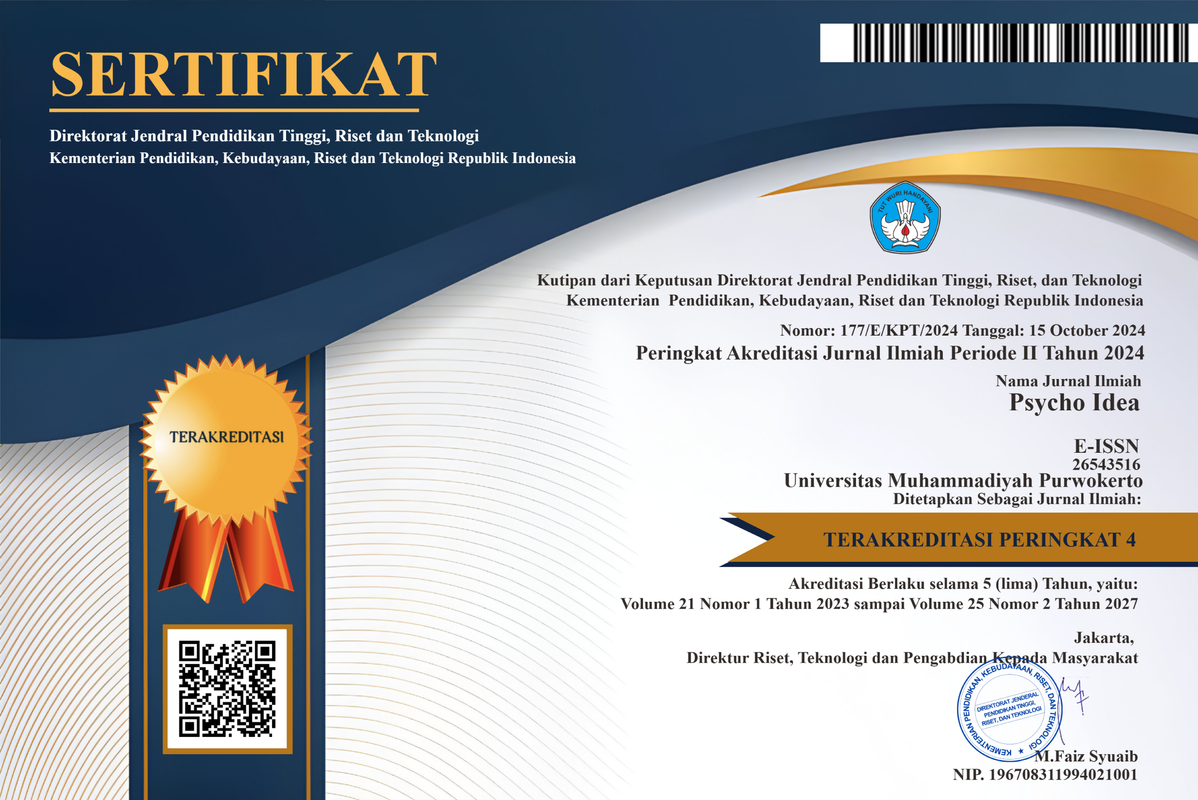DINAMIKA PSIKOLOGIS MAHASISWA FAKULTAS PSIKOLOGI UNIVERSITAS MUHAMMADIYAH PURWOKERTO PELAKU PROKRASTINASI AKADEMIK
DOI:
https://doi.org/10.30595/psychoidea.v11i2.513Abstract
Penelitian ini bertujuan untuk mengkaji dinamika psikologis mahasiswa Fakultas Psikologi Universitas Muhammadiyah Purwokerto pelaku prokrastinasi akademik. Penelitian ini menggunakan pendekatan kualitatif dengan pendekatan studi kasus. Data dikumpulkan melalui interview pada 8 orang informan penelitian, dengan rincian 4 orang informan primer dan 4 orang informan sekunder, analisis data menggunakan analisis data interaktif (interactive model of analysis). Hasil penelitian menunjukkan bahwa keempat informan memiliki dinamika yang berbeda-beda. Penundaan tugas yang terjadi karena mendahulukan organisasi, adanya rasa malas, dan menunda tugas yang tidak disukai. Keterlambatan dalam mengumpulkan tugas lebih menonjol pada lamanya mempersiapkan diri dalam mengerjakan tugas. Kesenjangan waktu antara rencana dan kinerja aktual terhadap tugas sering kali terjadi karena sering cuti kuliah, perencanaannya tidak tercatat sehingga banyak tugas yang tidak terlaksana, pergi keluar kota dan jarang mengikuti perkuliahan sehingga tidak dapat memenuhi tugas sampai batas waktu pengumpulan tugas yang telah ditentukan. Melakukan aktivitas yang lebih menyenangkan yaitu browsing di internet, bermain game, jalan-jalan, cenderung aktif di organisasi, dan bekerja baik bekerja sesuai proyek dan bekerja diluar kota sehingga kesulitan membagi waktu. Kata Kunci : Dinamika psikologis, Prokrastinasi, AkademikReferences
Annisa, dkk. (2010). Hubungan Kecanduan Chatting dengan Prokrastinasi Akademik. Jurnal Psikologi Proyeksi ISSN: 1907-8455, Vol 5, Nomor 2, Oktober 2010
Bahtiyar, E.C. (2010). Relationship Among Perfectionism, Academic Procrastination and Life Satisfaction of University Studen. Journal Of Procedia Social and behavioral Sciences 5, 1665-1671
Djojodibroto, R. D. (2004). Tradisi Kehidupan Akademik. Yogyakarta: Galang Press. http://books.google.co.id// diakses Juli 2012
Ferrari, J.R, dkk. (1995). Procrasnation And Task Avoidance: Theory, Research And Treatment. New York: Plenum Press. http://books.google.co.in/books?id/ diakses Februari 2012
Ferrari, J.R, Tice, D.M. (2000). Procrastination As A Self-Handicap For Men And Women: A Task Avoidance Strategy In A Laboratory Setting. Journal Of Research In Personality, 34, 73-83
Ghufron, M Nur dan Rini R. (2010). Teori-Teori Psikologi. Yogyakarta: Ar-Ruzz Media
Hurlock, E. B. (2004). Psikologi Perkembangan, Suatu Pendekatan Sepanjang Rentang Kehidupan, Edisi Kelima. Jakarta: Erlangga.
Maria, F. WPS. (2009). Dinamika Proses Prokrastinasi Akademik Pada Penyusunan Skripsi. Ringkasan Skripsi. Tidak diterbitkan: Fakultas Psikologi Universitas Gajah Mada
Priska, D. A. (2008). Prokrastinasi Pada Mahasiswa dalam Penyelesaian Skripsi. Jurnal Psikologi Universitas Gunadarma. http://paper.gunadarma.ac.id/prokrastinasipadamahasiswadalampenyelesaianskripsi.pdf diakses Februari 2012
Sugiyono. (2011). Metode Penulisan Kuantitatif Kualitatif dan R & D. Bandung: Alfabeta
Yemima, H. (2009). Hubungan Asertivitas dengan Prokrastinasi Akademik pada Mahasiswa Fakultas Psikologi Universitas Diponegoro Semarang. Jurnal Psikologi Universitas Diponegoro, http://eprints.undip.ac.id/10517/1/JURNAL.pdf diakses Januari 2013
Vensi dkk. (2008). Perfeksionisme, Prokrastinasi Akadeimk dan Penyelesaian Skripsi Mahasiswa. Jurnal Anima Indonesian Psychological Journal Vol. 23 No. 3, 25
Downloads
Published
Issue
Section
License
Authors published in this journal agree to the following terms:
- The copyright of each article is retained by the author (s) without restrictions
- The journal allows the author(s) to retain publishing rights without restrictions
- The author grants the journal the first publication rights with the work simultaneously licensed under the Creative Commons Attribution License, allowing others to share the work with an acknowledgment of authorship and the initial publication in this journal.
- Authors may enter into separate additional contractual agreements for the non-exclusive distribution of published journal versions of the work (for example, posting them to institutional repositories or publishing them in a book), with acknowledgment of their initial publication in this journal
- Authors are permitted and encouraged to post their work online (For example in the Institutional Repository or on their website) before and during the submission process, as this can lead to productive exchanges, as well as earlier and larger citations of published work
- Articles and all related material published are distributed under a Creative Commons Attribution-4.0 International Public License (CC - BY 4.0).
License
Psycho Idea is licensed under a Creative Commons Attribution- 4.0 International Public License (CC - BY 4.0).
You are free to :
Share — copy and redistribute the material in any medium or format
Adapt — remix, transform, and build upon the material for any purpose, even commercially











